It’s a small, digital ritual to capture Commencement, the (traditional) Religion Department send off at graduation, and honor our unforgotten, unforgettable class of 2020.
Tag Archives: Class of 2020
Senior Spotlight 2020: Abe Goren
a series about our graduating seniors
“The religion department was a supportive, tight knit community that allowed me to really dig into the ‘why’ and ‘how’ of the system.”
–Abe Goren
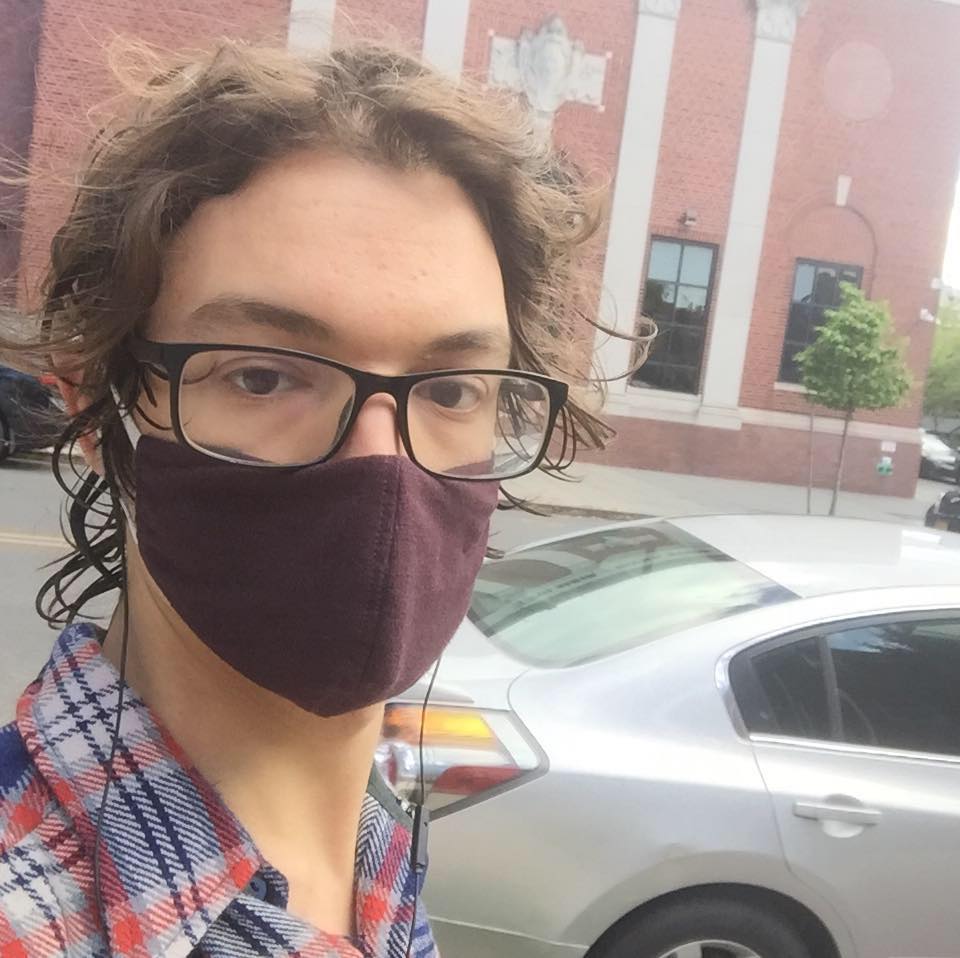
Why did you major in Religion?
In high school I was fascinated by religion both as a cultural system and as a place to find my identity. I’m very intrigued by the aesthetics of religion and religious performance, whether it be music, costumes, art, rituals or literature. I think people of my generation don’t think of religion day to day, but it’s such a powerful and immersive force. I initially was an anthropology major but switched to religion because religion had more direct intersection with my interests.
The religion department was a supportive, tight knit community that allowed me to really dig into the “why” and “how” of the system. One thing that drew me to the religion department was becoming friends with Shakir Stephen, a religion graduate (and current grad student at NYU) who really convinced me that the religion department was the way to go.
Where do you imagine yourself in 10 years?
It’s hard to say. I think I imagine gaining ground with making music. Music has been a very big hobby for me as of late, and a way for me to keep sane. I imagine that in addition to cultivating a music career, I will likely want to pursue graduate work in religion, pop culture and musical fan communities.
Imagine a first-year student has asked your advice about REL courses. What’s the one she shouldn’t dream about missing? Why?
I highly recommend anything with Prof. Vicki Brennan. Her classes are hands on, informative and fascinating. To have experience with working with museum curation was excellent.
If you could write any book, what would it be?
I really want to write an occult book/manual mocking the style of superfascist esotericist Julius Evola from a queer, trans perspective. This is not to endorse Evola, I hate the man! Rather, I think I can try to rearrange his philosophies and ideologies to be about gender transcendence, trans jñanayoga and nonbinary asceticism. I want to call it Gender Amongst the Ruins or Revolt Against the Transphobic World, and it would be a more materialist analysis of perennial traditionalism if that’s even possible. It probably wouldn’t be, but I want to use National Mysticism tropes to define trans people. I want to move away the “queer witchy vibes” that a lot of trans pagans use and onto more straightforward Theosophical ideology, that remembers the roots of modern occultism. I would throw out “root races” as a concept, of course.
Any fond memories of 481 Main Street you want to share?
I remember when I was in my first semester, I went from office to office, saying hi to different professors. It was a great way to randomly meet and socialize with people who knew their stuff about religion.
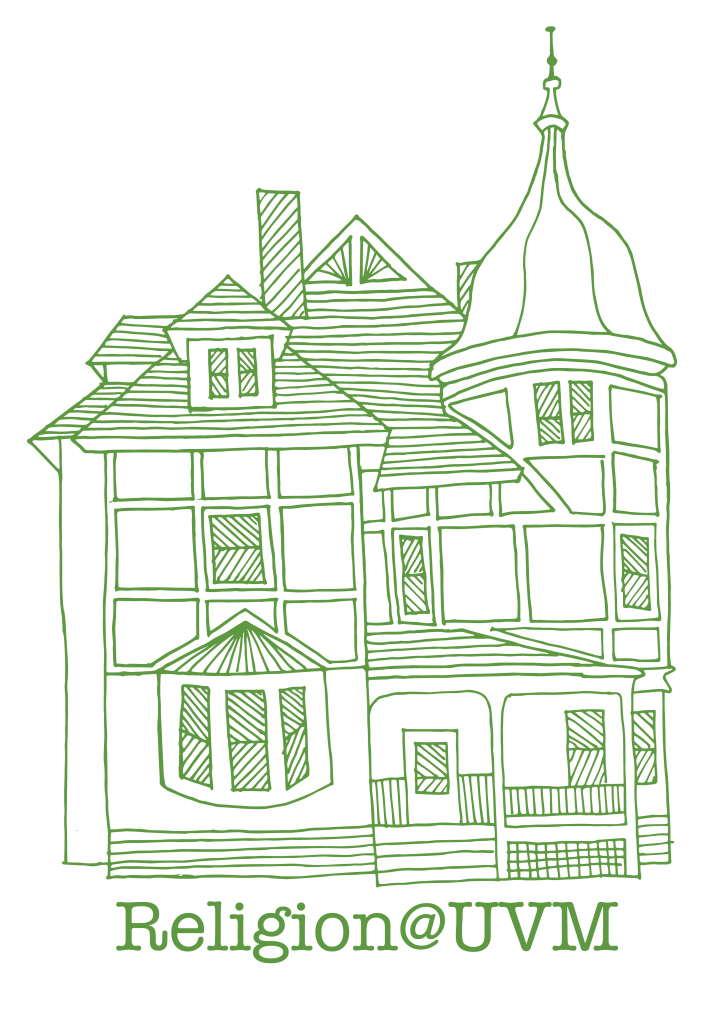
COVID-19 Bonus Question! You’re finishing up in the midst of the COVID-19 pandemic. Tell us something about that experience!
I’ve been spending a lot of time taking walks, wondering about my gender identity and making music. In addition, I’ve been binging Parks and Rec with my mom. It’s a great way to unwind every night and a great way to bond. Parks and Rec has a lot of religious aspects to it, at least with the fundamentalist watchdog Marsha Langman, and the opportunistic Wamapoke Cheiftan, who uses white people’s superstitions about Native Americans against them.
Senior Spotlight 2020: Caleb George-Hinnant
a series about our graduating seniors
“Frequently, I considered religion classes–alongside copious amounts of coffee–to be my incredible coping mechanism during the pursuit of a STEM degree. But they were also so much more than that. They revolutionized my ability to write and to critically analyze all institutions of knowledge and power.”
–Caleb George-Hinnant
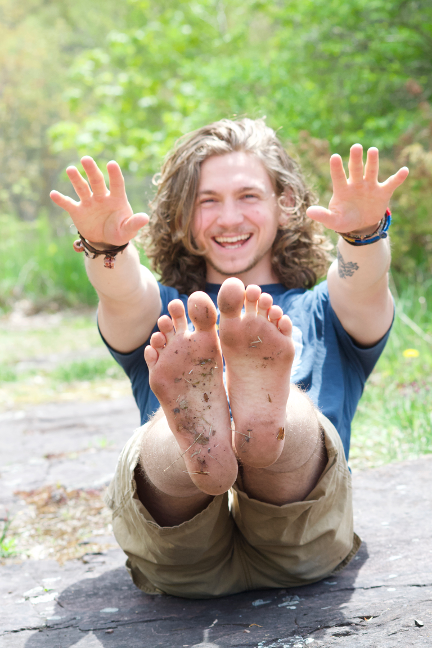
Why did you major in Religion?
I came to UVM as a biomedical engineering major. After spending my first semester in engineering classes, I took Comparing Religions with Dr. Ilyse Morgenstein Fuerst to fulfill my diversity requirement. This class convinced me to take more religion classes in tandem with a neuroscience degree which I had decided to transfer into.
Although understanding the brain had been a long-term goal of mine, religion classes were almost a vacation away from the hard path of studying synapses and biological processes. Religion classes were simultaneously some of my most challenging, intellectually stimulating, and motivating experiences at UVM.
Frequently, I considered religion classes–alongside copious amounts of coffee–to be my incredible coping mechanism during the pursuit of a STEM degree. But they were also so much more than that. They revolutionized my ability to write and to critically analyze all institutions of knowledge and power. I wish I could write a long essay about why I majored in religion. However, it dissolves to a love for writing, analyzing “what people do,” and having the opportunity to share that experience the brilliant minds at UVMREL.
Where do you imagine yourself in 10 years?
This is definitely the last question any senior feels prepared to answer. First and foremost, alive. Maybe there will be puppies?
Imagine a first-year student has asked your advice about REL courses. What’s the one she shouldn’t dream about missing? Why?
Take any and all of them. More importantly than that, take classes that analyze issues of religion. My two favorites were the two 200 level courses I took: African Gods/Western Museums and Religion, Nation, and State. But more importantly, get more than one opinion, you’ll need to be comparing a lot of conflicting arguments at 481 Main.
If you could write any book, what would it be?
A good one. I think I would really like to write about the brain, neuroplasticity, meditation, what people find meaningful, and how experience and self-reference shape the ways in which we believe ourselves to be “us.” Or possibly a book of opinions. Either way, I hope it helps somebody.
Any fond memories of 481 Main Street you want to share?
Snack times with Professor Borchert! Often that class did not feel like a class, rather a riveting hour in which we uncovered the hidden nature of our topics. Also all of the (previous semesters’) Reading Days, during which students from various classes came together to share in snacks and stress for final projects in the seminar room.

COVID-19 Bonus Question! You’re finishing up in the midst of the COVID-19 pandemic. Tell us something about that experience!
In the midst of a global crisis, barreling down the train tracks of peril, while sipping tea of calming thoughts in our couches seated in our homely homes each six feet apart on the expressway riding the curve, we look to our captain, sure that the egomaniac who is so disconnected from reality might look the other way so we may have the opportunity to steer the course straight.
Writing about global drama, systems of power, political injustice, colonialism, the neurotypical tragedies of addiction, tribal mentalities, and existential meanings of truth has never been so much fun in my comfy pants.
Senior Spotlight 2020: Ava Williams
a series about our graduating seniors
“I continued taking religion classes because I wanted to know why abstract ideologies compel individuals to think and behave in certain ways. I became a religion major because I wanted to know how individuals mobilize under their religion to effect macro-level social and political change. ”
–Ava Williams
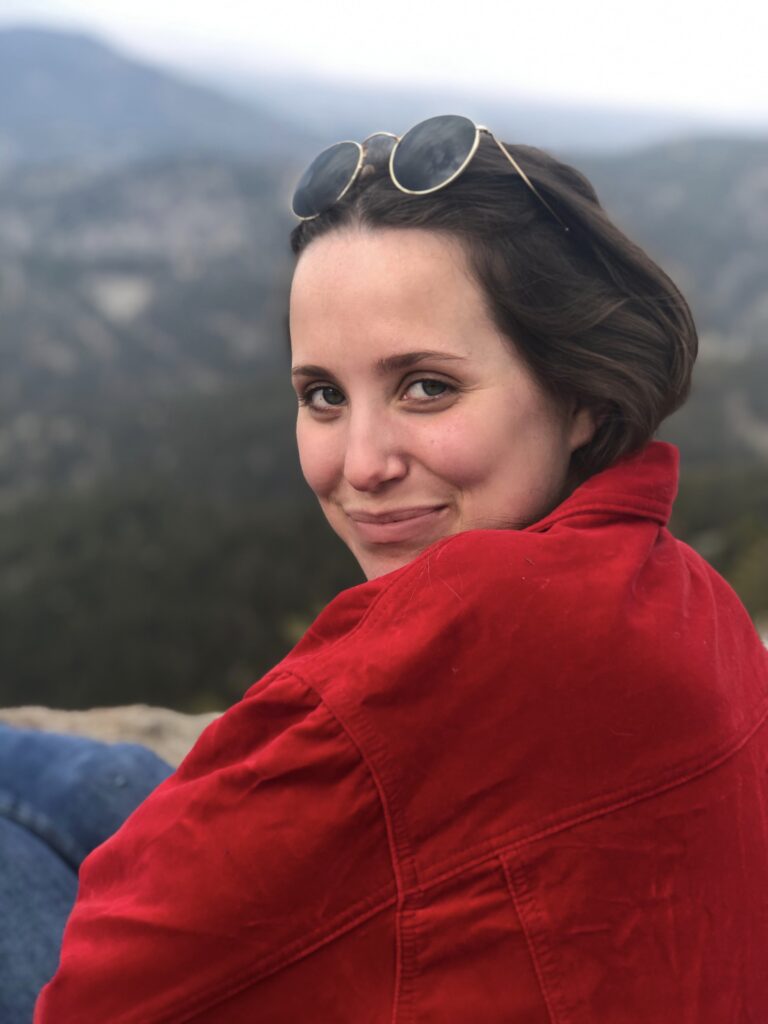
Why did you major in Religion?
In the hectic midst of picking out classes during first year orientation, I found myself signing up for the religion TAP “What is the Bible.” While I originally took the class under the seemingly classic “religiously raised kid turned pessimistic atheist” guise, I soon learned the faults in my own worldview. I began to understand that religion is more than a sacrosanct dedication to the words of ones god– it is a means of building community, a way of coercing behaviors above secular law, and it factors quite literally into everything in our world.
I continued taking religion classes because I wanted to know why abstract ideologies compel individuals to think and behave in certain ways. I became a religion major because I wanted to know how individuals mobilize under their religion to effect macro-level social and political change.
Where do you imagine yourself in 10 years?
Ask me in 10 years!
Imagine a first-year student has asked your advice about REL courses. What’s the one she shouldn’t dream about missing? Why?
Arguably, the most impactful class I took in the Religion Department was “REL 196: Religion, Race, and Ethnicity in the United States.” This class challenged me to think critically of the U.S. through the lens of religion. Through looking tracing the development of religion, race, and ethnicity, we studied how these invented categories were employed to help form and maintain our hierarchical society. I recommend this class to any students who want to analyze religion in the context of U.S. politics and history.
If you could write any book, what would it be?
My capstone project was titled “‘The World’s Oldest Colony’: Cultural Nationhood, Political Nationalism, and Religious Activism in Puerto Rico.” It investigated how religion factored into the development of the Puerto Rican cultural nation and how religious actors mobilize within the secular politics of Puerto Rico. If I had the chance to write a book, I think that it would be tied to this capstone project because there is a wide scholarly void in understanding religion in Puerto Rico. I think that it would be quite fun to research the island on a larger scale to fill this scholarly void and to show the world how deep and multifaceted Puerto Rico truly is.
Any fond memories of 481 Main Street you want to share?
Although I can’t seem to choose a favorite memory of 481 Main, I think my most fond memories revolve around the community that we built within the religion building. It was quite special to take classes with the same core group of students since freshman year– we learned, grew, and laughed together for four years. I really enjoyed our strong support system and watching my peers develop throughout our time together.
I do not think this community could have grown without our teachers who called us by name and remembered our favorite topics of study, our best papers. They were extremely adept at balancing the teacher and friend role; I don’t think that I would be half the person or scholar I am today without their motivation to help us learn.

Senior Spotlight 2020: Maddy Gale
a series about our graduating seniors
“[Islam & Race and Religion, Nation, & State] were rooted in scholarship that had real world, real time applicability. I left those classes with theoretical bones to pick and activism to do!”
–Maddy Gale
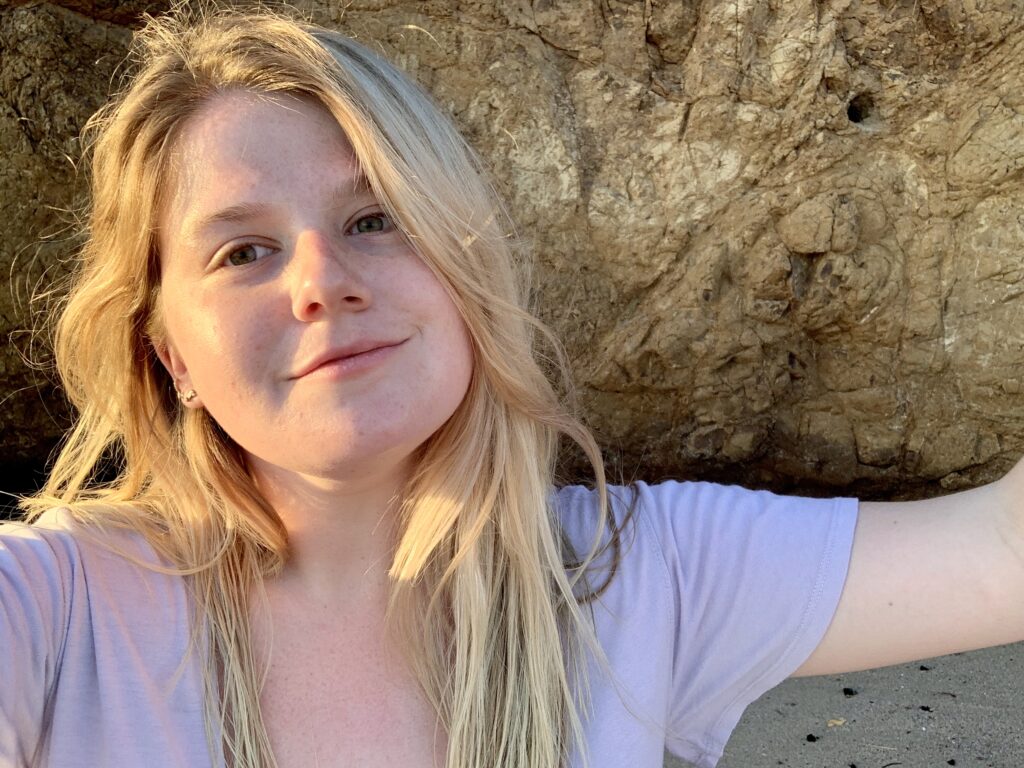
Why did you major in Religion?
My dad, a very open atheist, always told me the Bible was the best book he had ever read.
In high school, theology and philosophy were my favorite subjects, so coming to college, I knew it was an area of interest! After my Theater major turned into a minor and my English major wasn’t cutting it, I took Islam & Modernity with IRMF (uh, that’s Prof Morgenstein Fuerst), added a double major in Religion, and the rest was history.
Where do you imagine yourself in 10 years?
Writing! Not sure in what capacity, but I’m hoping that whatever career I’m in will involve writing.
Imagine a first-year student has asked your advice about REL courses. What’s the one she shouldn’t dream about missing? Why?
Ooh that’s tough. I would say it’s a tie between Islam and Race with IRMF and Religion, Nation, and State with Professor Borchert. Both classes were rooted in scholarship that had real world, real time applicability. I left those classes with theoretical bones to pick and activism to do!
If you could write any book, what would it be?
Yikes. Maybe a collection of short stories about losing a parent as a child, but that’s heavy… or a checking-my-white-girl-privilege type of memoir!
Any fond memories of 481 Main Street you want to share?
Cheese, crackers and sparkling cider in my Religion@UVM mug with Professor Trainor in Religion 100!

COVID-19 Bonus Question! You’re finishing up in the midst of the COVID-19 pandemic. Tell us something about that experience!
Hands down, my Religion professors have been the most understanding and kind humans during this time. This sh*t sucks, but every teacher from the department has had my back 100%. Thank you, thank you, thank you.
Senior Spotlight 2020: Conor Murphy
a series about our graduating seniors
“I also like how the Religion Department let me be in my Ivory Tower crafting theories–but, more importantly, encouraged me to really think about what’s happening on the ground, where the real bodies are at, and to be self-critical and retrospective of the words, ideas and agendas we talk about. I have not noticed this type of radical self-awareness of academia in other departments..”
–Conor Murphy ’20
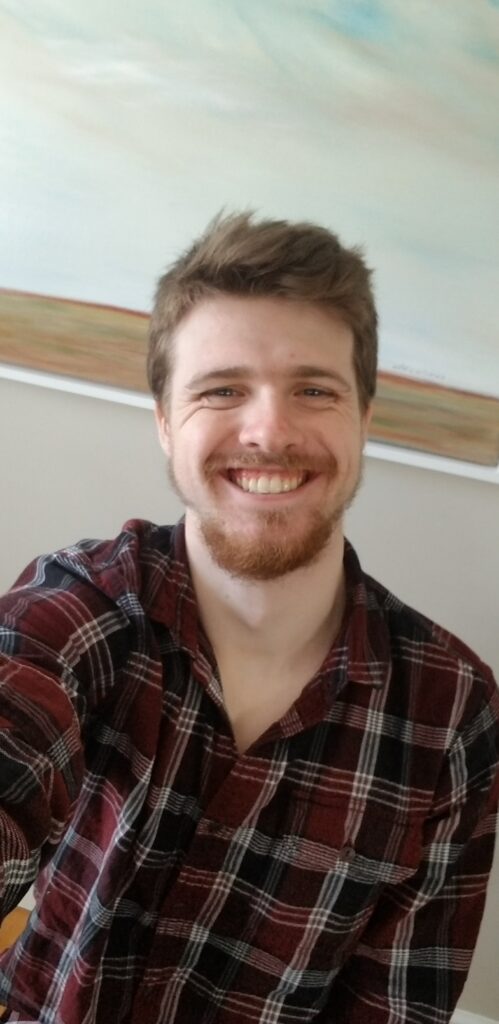
Why did you major in Religion?
I really like people watching–looking at people’s behavior and whatnot. Why do people do the things they do while thinking about what they are thinking? How do we each construct our own realities every day that affect our actions? A big part of that reality construct is religion or these things that may or may not be religion, but definitely sometimes “religion.”
I also like how the Religion Department let me be in my Ivory Tower crafting theories–but, more importantly, encouraged me to really think about what’s happening on the ground, where the real bodies are at, and to be self-critical and retrospective of the words, ideas and agendas we talk about. I have not noticed this type of radical self-awareness of academia in other departments.
Where do you imagine yourself in 10 years?
Oh god! Still studying Chinese, maybe ¯\_(ツ)_/¯. I have a lot of dreams that can’t all exist at once in the future. So I at least hope I am producing helpful knowledge and advocating cross-cultural communication. Whether it’s on a macro-scale like producing papers and research for universities or other large institutions or a micro-scale like teaching the Chinese language or helping students travel abroad. Maybe even through brewing beer! Who knows?! I sure don’t!
Imagine a first-year student has asked your advice about REL courses. What’s the one she shouldn’t dream about missing? Why?
First, everyone should take a REL course! Religion is always in the room and you need to figure out the ways colonialism has naturalized in your ideas. Colonialism is lame.
For me, the one course they shouldn’t miss is REL 145: Religion in China. Asia and specifically China–in my opinion as a Chinese & REL double major–is an interesting location with unique problems where we see the failure of translation of the word “religion.” Also, I am a big fan of Chinese ghost stories and ghost culture which is also covered in the course. A lot of popular ghost stories and horror movies come from Asia!
If you could write any book, what would it be?
Something about Chinese ghosts. It could be fiction or nonfiction, probably a little of both.
Any fond memories of 481 Main Street you want to share?
It’s my favorite building on campus. I just love the atmosphere of the whole building. More importantly, I have had a really tough college experience: rocky waters and weak knee(s)! 481 Main street and REL classes make me feel safe and valid. All of the Religion Department profs are my heroes.

COVID-19 Bonus Question! You’re finishing up in the midst of the COVID-19 pandemic. Tell us something about that experience!
It blows! It is so difficult for me to work, regardless of me recovering from my second right leg surgery of 2020.
Additionally, the COVID-19 pandemic has caused the cycle of Orientalism to emerge again. Thanks to the Religion Department I feel really comfortable navigating through and debunking xenophobic and racist discourses. As someone who has spent time in China and has done a lot of academic work about the country, it’s just a bummer to see this stuff going on.
Senior Spotlight 2020: Carolynn Van Arsdale
a series about our graduating seniors
“The greatest skill a student can learn in [a Religion course] is being able to debunk mass generalizations and stereotypes, which is crucial to understand regardless of what career one has.”
–Carolynn Van Arsdale
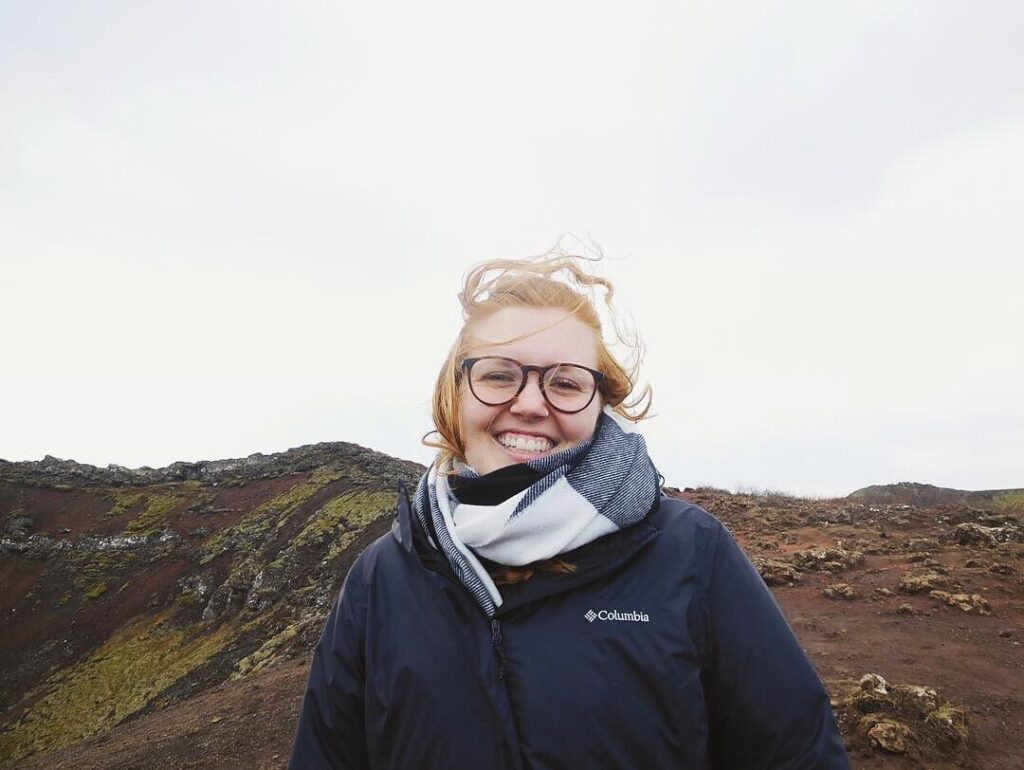
Why did you major in Religion?
One of my first classes at UVM was a TAP course with Prof. Anne Clark titled What is the Bible? I thoroughly looked forward to doing the work for the course, and the class discussions constantly “blew my mind.” During the following semester I enrolled myself in Introduction to Islam with Prof. Ilyse Morgenstein Fuerst, which totally sealed the deal for me to spend a large part of my undergraduate degree on the academic study of Religion.
Where do you imagine yourself in 10 years?
What a scary, but fun question! No matter what industry I end up in… my hope is that I will be helping others, whether that be teaching, advocating, leading, etc. I am looking forward to working hard for others as well as my own happiness.
Imagine a first-year student has asked your advice about REL courses. What’s the one she shouldn’t dream about missing? Why?
Considering the fact that we live in a dominantly Protestant society, I would suggest that a first-year take Introduction to Islam. Not only did I enjoy this course, but it is most definitely a class worth taking if one wants to improve their religious literacy. The greatest skill a student can learn in this course is being able to debunk mass generalizations and stereotypes, which is crucial to understand regardless of what career one has.
If you could write any book, what would it be?
Save the Humanities: How the Liberal Arts can better our World
Any fond memories of 481 Main Street you want to share?
In What is the Bible? our class had dinner together in the Religion Seminar Room before heading to a Medieval Christmas Choir Concert at Southwick Hall. I became closer with my classmates, and it was such a treat to eat good food in a casual setting with one of my favorite professors. I managed to find two of my best friends from that class, and I am so grateful for that awesome experience.

COVID-19 Bonus Question! You’re finishing up in the midst of the COVID-19 pandemic. Tell us something about that experience!
I want to say a HUGE thank you to the Religion Department for going above and beyond during this time in how we as students are being cared for. It is not in a Professor’s job description to make sure that students are safe and healthy, but Religion Professors do it anyway. This has been and will continue to be a meaning-making experience for me, and completing my undergraduate degree will be a part of that.
EDITOR’S NOTE:
Carolyn Van Arsdale is the 2020 winner of the
Outstanding Major Award.
